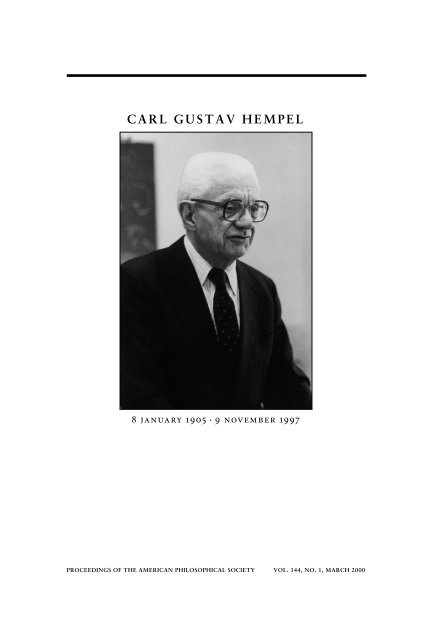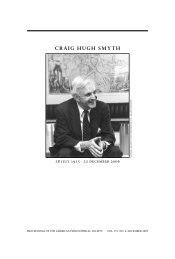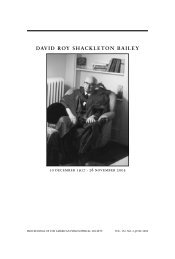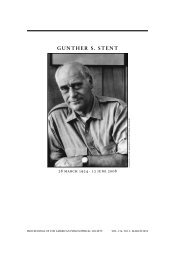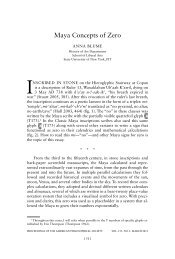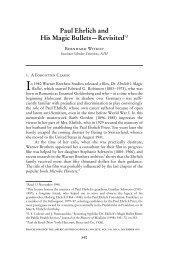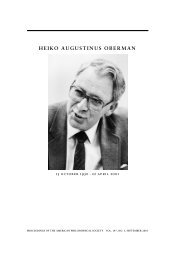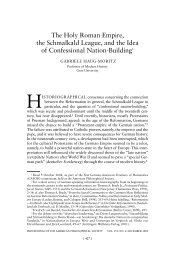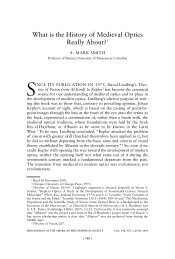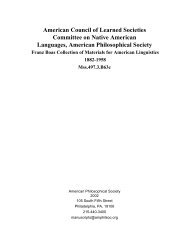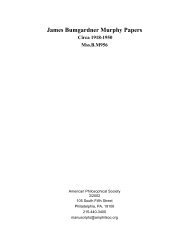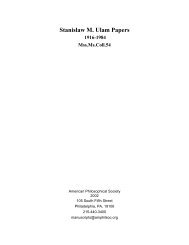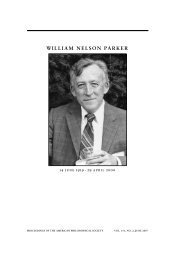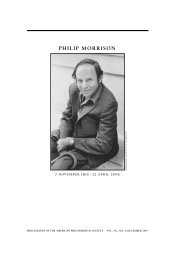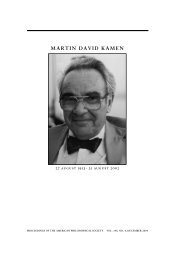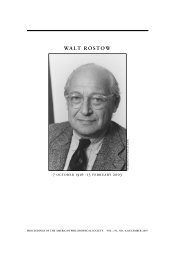CARL GUSTAV HEMPEL - American Philosophical Society
CARL GUSTAV HEMPEL - American Philosophical Society
CARL GUSTAV HEMPEL - American Philosophical Society
Create successful ePaper yourself
Turn your PDF publications into a flip-book with our unique Google optimized e-Paper software.
<strong>CARL</strong> <strong>GUSTAV</strong> <strong>HEMPEL</strong><br />
8 january 1905 . 9 november 1997<br />
PROCEEDINGS OF THE AMERICAN PHILOSOPHICAL SOCIETY VOL. 144, NO. 1, MARCH 2000
carl gustav hempel<br />
<strong>CARL</strong> <strong>GUSTAV</strong> <strong>HEMPEL</strong> (who was known informally as<br />
Peter) was a central figure in the development of logical<br />
empiricism. He lived in “interesting” times, times that drove<br />
him out of his native Germany, first to Belgium and then to the United<br />
States. He studied mathematics, physics, and philosophy at the universities<br />
of Göttingen, Heidelberg, Berlin, and Vienna, receiving his doctorate<br />
in Berlin in 1934, just a week before Hitler assumed the mantle<br />
of Führer-Reichskanzler. He had written most of his dissertation (on<br />
the logical analysis of the concept of probability) under the supervision<br />
of Hans Reichenbach when Reichenbach was abruptly dismissed from<br />
his Berlin chair in 1933. (Hitler had just become chancellor.) The ensuing<br />
problem of finding competent referees was sidestepped when Wolfgang<br />
Köhler and Nicolai Hartmann agreed to serve nominally, in<br />
Reichenbach’s place. By then, Hempel and his wife, Eva Ahrends, had<br />
moved to Brussels, where his friend and collaborator Paul Oppenheim<br />
had made it possible for them to support themselves.<br />
In August 1937 they moved to Chicago, where Rudolf Carnap had<br />
obtained a Rockefeller research fellowship for Hempel. In 1939–40 he<br />
taught summer and evening courses at City College, New York, before<br />
being appointed assistant professor at Queens College, New York,<br />
where he, Donald Davidson, and Arnold Eisenberg were colleagues.<br />
He left Queens College in 1948 to join Yale’s philosophy department.<br />
It was in this period that Eva Ahrends died, shortly after giving birth to<br />
their only child, Peter Andrew. Three years later, Peter married Diane<br />
Perlow.<br />
Hempel remained at Yale until 1955, when, after a semester’s visit,<br />
he accepted Princeton’s invitation to join its philosophy department as<br />
Stuart Professor of Philosophy, a post he held until mandatory retirement<br />
at age sixty-eight, in 1973. He continued to teach at Princeton for<br />
the next two years, before moving to the University of Pittsburgh as<br />
university professor of philosophy in 1977. Upon his retirement from<br />
Pittsburgh in 1985 he returned to Princeton, where he continued his<br />
philosophical work for another decade. He died there on 9 November<br />
1997 at the age of ninety-two.<br />
Although himself of unexceptionable “Aryan” stock, Hempel<br />
exhibited an insensitivity to such matters of a sort that constituted an<br />
offense in Nazi Germany—so-called “Philosemitism”—an offense<br />
against which his father and other well-wishers had warned him more<br />
than once. Indeed, his wife Diane is Jewish, and his first wife, Eva, had<br />
inherited “Jewish blood” from her father—as had his teacher, Reichenbach,<br />
from his. That is what made Germany uninhabitable in 1934 for<br />
him as for them, and made him slow to revisit the country after the<br />
war.<br />
[96]
iographical memoirs<br />
As a university student he had been preparing himself to teach<br />
mathematics in high school after receiving the doctorate. He thought<br />
he would have enjoyed that life. At Princeton he chose to teach introductory<br />
courses—Introduction to Logic and Introduction to the Philosophy<br />
of Science, year after year, with an uncanny renewal of freshness<br />
that amazed and inspired those who had the privilege of assisting him.<br />
His graduate seminars, in which he brought novices to the point at<br />
which they could make their own contributions, were models of what<br />
such courses could be. His example created an environment in which<br />
beginning and advanced students could thrive, and in which everyone<br />
learned from everyone else. What lay behind his preference for the<br />
introductory was not a logical empiricist’s sense that more advanced<br />
students of vernacular philosophy would have been better off had they<br />
known less, but a kind of love or reverence or care for naïve minds—a<br />
sense, as he once put it, that they are the salt of the earth. Although he<br />
had many students, he did not spawn doctrinal disciples. What students<br />
carried away from him was a passion for clarity and a devotion<br />
to rational argument.<br />
Peter served as the Princeton philosophy department’s director of<br />
graduate studies for decades. In his quiet way, he guided Princeton’s<br />
graduate program, gradually transforming it into one that achieved<br />
national prominence. With Thomas S. Kuhn and Charles C. Gillispie,<br />
he shared in the glory years of Princeton’s Program in the History and<br />
Philosophy of Science, culminating in a course in which undergraduates<br />
were treated to the extraordinary experience of an introduction to<br />
the philosophy of science taught by C. G. Hempel and T. S. Kuhn.<br />
Personally, he was notably playful, incapable of stuffiness or cant.<br />
There was no arrogance in him; he got no pleasure from proving people<br />
wrong. His criticisms were always courteous, never triumphant.<br />
This was deeply rooted in his character. He welcomed opportunities<br />
for kindness and generosity and gave his whole mind to such projects<br />
spontaneously, so that effort disappeared into zest. Diane was another<br />
such player. (Once, in a restaurant, someone remarked on their politeness<br />
to each other, and Diane said, “Ah, but you should see us when<br />
we are alone together. [Pause] Then we are REALLY polite.”)<br />
Many have marveled at his willingness to change his mind. Such<br />
philosophical lightness seems incompatible with the meticulous attention<br />
to the details of argument and definition for which he is famous:<br />
the paradoxes of confirmation, the critique of the logical positivist conception<br />
of empirical meaningfulness, the analysis of explanation. But<br />
the lightness was lack of nostalgia for bits of doctrinal baggage with<br />
their familiar stickers. He had no interest in ownership of such<br />
pieces—he really did just want to know the truth—and when a decade<br />
97
98<br />
carl gustav hempel<br />
or two of close thought and argument persuaded him that some piece<br />
was empty, he would push it overboard.<br />
A friend (Wolfgang Spohn) described him a few years before his<br />
death: “A delicate little old man with an extra large, almost square<br />
head covered with vigorous snow white hair, eyes blinking behind<br />
thick glasses, with the widest mouth I have ever seen—and when he<br />
began to speak with that cocky Berlin sound that unmistakably colored<br />
even his English, his entire furrowed face was set in motion. And the<br />
sun rose, a human warmth radiated from him together with an intellectual<br />
fire of strange intensity.”<br />
Elected 1966<br />
Richard Jeffrey<br />
Paul Benacerraf<br />
Department of Philosophy<br />
Princeton University<br />
[These remarks were adapted by Paul Benacerraf and Donald Davidson from a memoir by<br />
Richard Jeffrey.]


